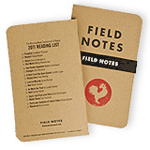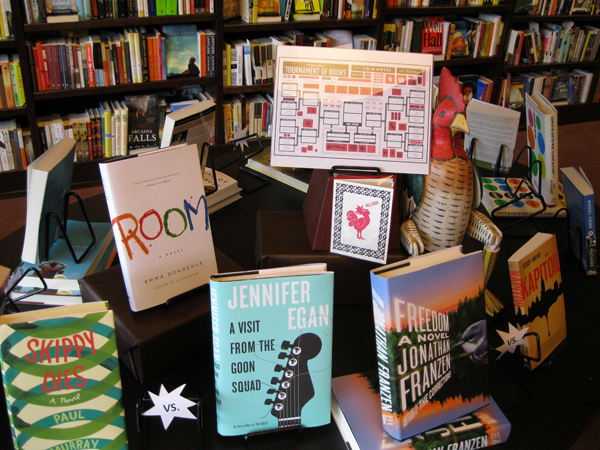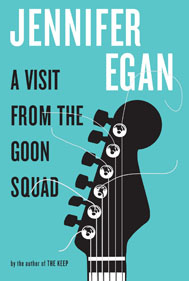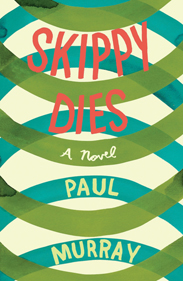-
March 11, 2011
Opening Round
-
Commentary by
Kevin Guilfoile & John Warner
-
Today’s Winner:
2A Visit From the Goon Squad
John: Tony Doerr is probably due for a lifetime achievement award in Rooster judging for both the quality and frequency of his contributions. This year, he has to be pretty excited that he wasn’t given the wild-card matchup like his last outing in 2009, where he had to choose between a National Book Award winner and a charming young adult novel, or 2007, where he had to try to make it through Thomas Pynchon’s Against the Day.
We should also note that he knows a little bit about awards, having just won the Story Prize for his terrific collection, Memory Wall. To have one of our best living short-story writers weigh in on a matchup with a book of stories is a fortunate break for us.
Kevin: Yes, congratulations to Tony. He’s a fantastic writer and we have been lucky to have him so closely associated with the ToB all these years. (A reminder: Powell’s is offering 30 percent off Memory Wall for the duration of the tourney.)
After Jennifer Egan’s win last night at the National Book Critics Circle Awards, I felt a little bit of the pride you get when your spouse gets a big raise at work, as reading A Visit From the Goon Squad was almost like having a relationship for me. (Insert Shandlingesque zinger about a minimal amount of sex between the covers and me never getting a word in edgewise here.)
I started the book without knowing very much about it. I hadn’t read any reviews. And I was very excited about the first 30 pages or so, and then as each chapter spiraled farther and farther away from the characters that had been established early on, I sort of fell out of love. I was frustrated. And then somewhere around the halfway point I realized with a forehead slap that this isn’t really a novel at all. And when I recalibrated with the understanding that this was a collection of short stories, I raced to the end. I fell back in love with this book and I fell hard.
 Buy anything from Field Notes from now until the end of the ToB and receive a special “reading list” memo book free, while they last. Use coupon code ROOSTER.
Buy anything from Field Notes from now until the end of the ToB and receive a special “reading list” memo book free, while they last. Use coupon code ROOSTER.Plenty of writers before Egan have attempted the novel of connected short stories, of course. It is a time-tested wrench in the MFA toolkit, often used to string together two years of classwork into something publishable, but Goon Squad is a work of great skill. Many of these stories would be terrific on their own, but placed together and in this order, Egan creates some real magic. From beginning to end the relationships between the stories and characters seemed completely organic to me. I never felt like the premise was just sugar to make a story collection easier for readers to swallow.
That said, I knew that the PowerPoint story was coming, and I wasn’t optimistic about it. Just on the surface, flipping through those pages of boxes and arrows, it seemed like such a grad-school gimmick, like something McSweeney’s stopped doing 10 years ago. Once again I had the smug soapbox of my expectations knocked completely from under my feet. That chapter is genuinely moving. Given Egan’s talents as a writer, I’m not sure that particular story wouldn’t have been even more effective if she had told it in prose, but the fact that she could pull it off with such emotional power makes the attempt totally worth it. Could Philippe Petit have found a more productive way to spend his hours than training to walk on a tightrope between the Twin Towers? Almost certainly. But as a human being who loves to be surprised and inspired, I’m glad he did it.
John: Or, could Gallagher have found a more productive way to spend his hours than smash things with a giant sledgehammer and spew homophobic slurs and right-wing paranoiac propaganda?
Bad example, but I take your point.
For me, Jennifer Egan is in the category of writers like Margaret Atwood and T.C. Boyle, where it’s sort of impossible for her to write a bad book, even though she tackles something different every time. Her books are just very alive down to the sentence level, inventive and surprising, even when you’re braced against them as with the PowerPoint story, which I also approach with a sneer, but was won over by, kind of like my attitude towards Katy Perry, and Jennifer Egan managed to do it without shooting fireworks out of her breasts. (As far as I know.)
The greatest virtue of Goon Squad for me is its playfulness. The interconnections among the stories are occasionally quite loose, each one at best a handoff from the other, a baton passed, and this allows her to wander far afield in search of interesting characters and conflict. But this is at the expense of that feeling of accrual that a really good novel can achieve, and I often felt myself long for that as I made my through. Even as I admired each story in isolation, I sensed that Egan could have employed the sprawling cast in the service of a more traditional novel, and I guess that’s what I wanted. This isn’t a particularly fair criticism, though, and I hate to say it, but one of the virtues of the Tournament of Books is the opportunity to examine our own biases.
Maybe the reason Egan is so good is because she practices a rigorous quality control on her own work, as highlighted in this recent article of abandoned projects, where it’s revealed that at age 22, she chucked a 600-page manuscript.
Or maybe the secret to her success is that she was able to write even a “failed” novel at 22. At 22, I was traveling the country, scalping Gallagher tickets for beer money.
Kevin: Of all the books on the ToB shortlist that I hadn’t yet read, Skippy Dies was the one I was looking forward to most. And here’s where I confess that I never got to it. In the interest of efficiency I read the shorter books first and here I am feeling very sorry that I have so much to say about Egan and so little to say about Murray. I am still excited to read it, but unless Skippy Dies makes a return in the Zombie Round, it will be too late for the ToB.
John: Skippy Dies is one of those multi-character, many-threaded novels that manages to hold everything together all the way through to the end. For me, it was the best book of the year, superior to Freedom. What’s especially impressive about Skippy Dies is that it does this without resorting to sprawl, or even covering all that much time, chronologically (like Freedom). All the action is set at an Irish boarding school over a period of several months, and it builds tension on multiple fronts, simultaneously. The dialogue among the students is the funniest and sharpest I’ve read in years. My investment with the characters is deep and lasting. The title is no spoiler, since the titular character is killed off in the first paragraph. (It’s like Gallagher smashing the watermelons first.) As we go back in time and get to know Skippy and his friends, the heart breaks a little as his inevitable death approaches. Reading it, I got the feeling that Paul Murray put everything he had in the book. No withholding whatsoever.
Kevin: I am glad you have such praise for it, then. I will begin reading almost immediately.
It’s interesting that you are so Gallagher-obsessed today as I just finished listening to Marc Maron’s Gallagher interview-gone-awry on the WTF Podcast. If you are not listening to the WTF Podcast you are missing out on perhaps America’s best accidental interviewer baring the dark parts of his psyche week after week. This shouldn’t have anything to do with books—Maron interviews mostly comics—and the Gallagher train wreck isn’t even a great example of anything except confirmation that Gallagher is a shrieking douche (hey, I just named a pub!), but almost all of Maron’s conversations with comedians touch on topics that should be of interest to readers and writers as well, whether it’s plagiarism or social conscience or baring your blackest fears and desires to your audience. Plus, the Tournament of Books is loosely engaged in the promotion of excellent things with which to spend your valuable time and the WTF Podcast is in that category.
And speaking of excellent things, we’re hearing about some awesome bookstore displays featuring the ToB. The Bookstore in Glen Ellyn, Ill., has gone full Rooster with both a window and in-store display:
Also, WORD in the Greenpoint neighborhood of Brooklyn is looking sharp with this set-up:
Flyleaf Books in Chapel Hill, N.C., went so far as to include a menacing, albeit wooden rooster who presides over their display:

If your bookstore is doing something special for the Rooster, let us know either by emailing or by tweeting a photo with the hashtag #ToB2011 and we’ll be sure to give your joint a plug.
OK, then. Goon Squad meets The Finkler Question in the quarterfinals. On Monday we have the draw Tony Doerr was probably expecting this year, the wild card of wild cards, Anne Carson’s box of Nox colliding with the National Book Award winner, Jaimy Gordon’s Lord of Misrule.
Kevin Guilfoile is the author of two acclaimed novels, Cast of Shadows and The Thousand, which have been translated into more than 20 languages.
John Warner’s novel, The Funny Man, will be released late September of this year by Soho Press. For the time being, he teaches at Clemson University.



















